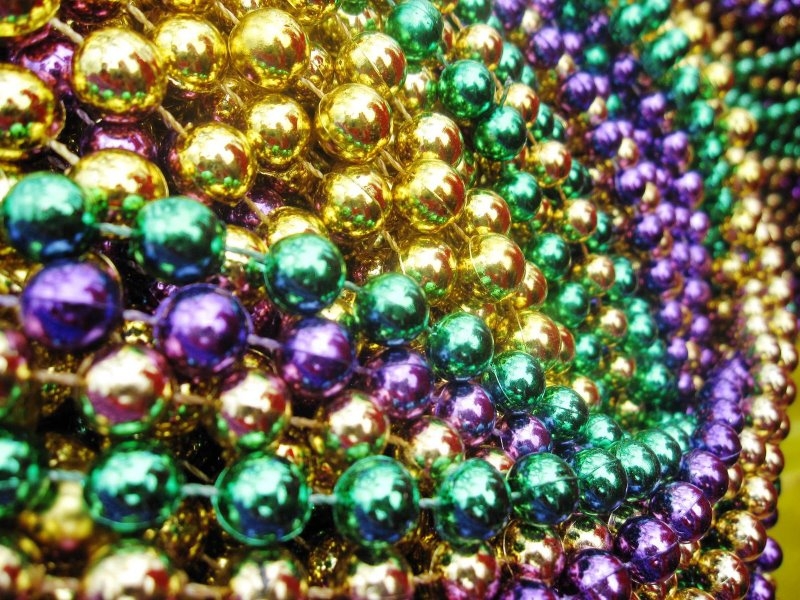For better or worse, the Carnival season tends to inspire excess in all things involving color, flavor, entertainment, and showmanship. But while this time of year does showcase our city’s traditions, creativity, and craftsmanship, those excesses can also become bigger messes to clean up afterward.
From hangovers, legal woes, and trash-clogged sewer drains to contaminated soil and groundwater, mindless revelry at Mardi Gras takes an undeniable toll on the city of New Orleans, its residents, and the local flora and fauna.
Whether this is your first, 15th, or 50th Carnival in New Orleans, every individual who partakes in this annual spectacle also has the responsibility to ensure its continuity and sustainability. With a few minor adjustments to how we treat and respect each other, the city, and the environment, Carnival 2019 and beyond can be more enjoyable for everyone—visitors and residents alike.

Educate yourself on the health hazards of plastic Mardi Gras beads
Fellow lifelong NOLA natives, prepare to cringe at childhood memories of putting Mardi Gras beads in your mouth or laughing about the colorful metallic rings a neck-full of beads left behind after a night of parades.
A 2013 report from Healthystuff.org, in collaboration with VerdiGras, found that more than half of the beads in their test sample contained concentrations of lead, bromine, and chlorine that surpassed recommended exposure levels, particularly for children, who are at high risk for potential lead poisoning. This information has been publicly available for years, and the Louisiana Department of Health and Hospitals has issued its own educational campaigns surrounding the safety of handling Mardi Gras beads, especially for children.
Still, plastic beads remain a very real public health hazard that has yet to garner enough attention from the public for the federal government, particularly the Consumer Products Safety Commission, to take notice. If possible, avoid these plastic beads at all costs and patronize parades and krewe organizations that choose to focus more on “the show, not the throw,” suggests Katrina Brees, captain of the Krewe of Kolossus.
If you cannot avoid plastic beads entirely, use disposable gloves to handle any beads while cleaning up around your home, place of business, or favorite spot along the parade route. After touching plastic beads, do not touch your face, another person’s hands, or your food or beverages without sanitizing your hands. Wash any clothing exposed to plastic beads themselves or the ground they land on, as lead and other compounds leach into and contaminate the soil.
Shifting the focus away from beads and throws and back to costumery and performance is the end-goal for many Carnival eco-activists. But in the interim, consider supporting businesses that distribute finely crafted beads made from recycled paper, such as Atlas Handmade Beads and Throw Me Something Green.
“When I was growing up, glass beads were the cool thing to catch, and we kept them,” says Gary Zoller, founder of Throw Me Something Green by Our Place Promotions. “[Our recycled paper beads] look like the glass beads of yore, and everyone who catches them keeps them. They’re cool enough to wear around because they don’t look or seem like cheap Mardi Gras beads.”
Leave no trace of your good times on the parade routes
It’s one of the first lessons many parents try to teach their children, yet the concept of cleaning up after one’s self is unfortunately all but foreign to many Mardi Gras revelers.
“Pack in, pack out,” Liz Shephard, founder and CEO of LifeCity, recommends. “Don't throw anything on the ground—leave no trace, Mardi Gras-style.”
Whether it’s your chili-cheese-stained paper trays, collection of throws, or cases of empty beer cans, do the city’s sanitation workers a solid: Leave your spot as clean as—if not cleaner than—how you found it.

Plan ahead to patronize local liquor and grocery stores and buy local food and beverage brands
Parade traffic, road closures, and an influx of visitors in the city can complicate even a simple stop for parade party supplies. Instead, plan into your day a stop at a locally owned grocery store, liquor store, or corner store. And while you’re there, choose locally produced food, beer, and spirit brands whenever they’re in stock.
Your hard-earned money then goes to support local businesses to ensure the community can thrive even when Carnival season is over. No one will judge or notice your case of big-brand domestics, but you will notice when Mardi Gras no longer has local businesses to support it in the future.

Hydrate responsibly
Movement during Carnival often means traversing to and from and up and down parade routes, bouncing to the echoes of marching band drumlines, and dancing away long nights into early mornings. In short, all that extra physical activity means your body needs even more water than usual.
Combine that with the potential for more daytime drinking and more consecutive instances of nighttime drinking than usual, and regular, frequent water breaks become a critical mindfulness tool.
Pro tip: Bring a refillable water bottle instead of relying on plastic water bottles. That means less weight and fewer objects for you to pack and lug to and from the parade route. Refilling one bottle all night also means less, if any, water-related trash, which further reduces the likelihood of overflowing trash and recycling bins.
Offer to tip your bartender a couple bucks to fill your water bottle on the go or fill it up at water stations when you find them.
Shift your Mardi Gras focus from “quantity” to “quality”
The most problematic excesses of Carnival stem from a misguided focus that overlooks the very essence of why Carnival is such a beloved global celebration.
“The biggest contributor is the mentality—that the throw is more important than the show or that quantity over quality is what people want,” Shephard says. “If we focus on higher quality or local impact, the pollution will be less.”
As with anything else during the Carnival season, remember: A little bit of mindfulness goes a long way.

